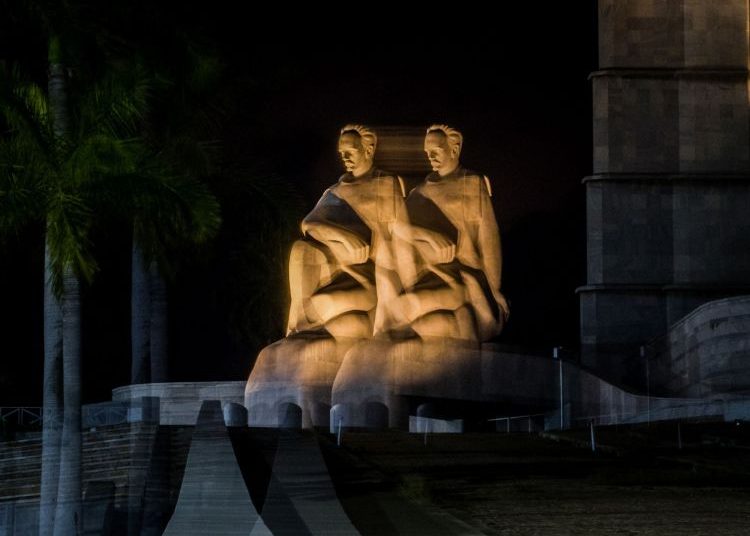The Ode to Joy, by Friedrich von Schiller, was first published in 1786. It reads:
“Joy, thou beauteous godly lightning,
Daughter of Elysium,
Fire drunken we are ent’ring
Heavenly, thy holy home!
Thy enchantments bind together,
What did custom stern divide,
Every man becomes a brother,
Where thy gentle wings abide.”
Three years after its edition, the French Revolution broke out. Schiller’s theme became a symbol of universal fraternity. Maximilian Robespierre made such a convincing defense of equality through fraternity that, in 1790, it was made part of the revolutionary motto.
Already in the second half of the 20th century, when the European Union was founded, a fragment of the Schiller/Beethoven piece was adapted as the entity’s anthem. It represented the promise of a new, democratic and inclusive Europe, which offered to leave behind the philosophies that led to the two world wars.
Beethoven made Schiller’s poem “speak” in the fourth movement of his Ninth Symphony. The German genius was an admirer of the French Revolution. He dedicated his Eroica Symphony to Napoleon Bonaparte, believing he was one of his champions, but when he was crowned emperor he viciously crossed out his name.
From Cuba, another admirer of the French exploit, José Martí, thought that Calderón, Shakespeare, Esquilo, Goethe, and Schiller were together “high up in the heavens.” “And at that height: nobody else.” He felt a similar admiration for Beethoven, who saved him from making a similar gesture toward Napoleon. Martí directly called him “the vile Corsican,” while writing for the children of America: “France was the brave people, the people who rose up in defense of men, the people who took power from the king. That was a hundred years ago, in 1789. It was as if one world ended, and another began.”
Revolutionary fraternity
If there was a ghost greater than communism after the French Revolution, it was fraternity. The European revolution of 1848 was the express revolution of the fraternal Republic. There was no revolutionary movement that did not make it its own. Since then and until today, it has been the “forgotten value” of that revolution, or has experienced a long “eclipse.”
However, in the 19th century it still had a clear meaning. It can be read in the Spanish newspaper La Carcajada (1872):
“’Freedom, equality, fraternity,’ there in very short words the entire codex of humanity is summarized; the golden dream of all men of clear intelligence and uplifted spirit, the problem of happiness for the peoples and that has always served as a boo [fear, terror] for all the tyrants of the earth.”
Esteban Montejo, the runaway slave of Miguel Barnet’s novel testimony, united fraternity with joy in a similar order of meaning Schiller had given it: “the most beautiful thing there is is to see the men united. That is seen more in the countryside than in the city.… There all the personnel have to live together, as in family. There has to be joy.” [1]
Montejo found food and freedom in the countryside, and there he celebrated fraternity and joy. Running away from slavery was his particular ode to joy, that is, to freedom.
Fraternity had a much earlier meaning, the Christian one, which celebrated the common descent from the Father, but respected the earthly order of the children with their virtues and their own inequalities―“to God what is God’s, and to Caesar what is Caesar’s”―. St. Paul attributed the domination to God and made it enforceable in particular to the poor and women.
The new―revolutionary―sense of fraternity meant something much more radical: reciprocity in freedom. This means a political program as concrete as turning those bound by ties of dependence and subjection into equally free—not into mere equals, less into identical ones. In Cuba that meant first of all colonial subjects, enslaved, workers and also, although much more invisible, women. [2]
Cuban fraternity
All sides of the Cuban independence political spectrum agreed on some of the political uses of fraternity.
Antonio Maceo claimed to be “part, and not negligible, of this democratic Republic, which has established freedom, equality and fraternity as its main base, and does not recognize hierarchies.”
Diego Vicente Tejera wrote: “From those shapeless ruins we must bring to light a new Cuba, in which there is everything that it lacked and for whose possession the old Cuba sighed, mainly a great deal of freedom and a great deal of justice, a great deal of justice, so that we can share our Republican motto, since justice is equality, and equality is fraternity.”
Ana Betancourt and Agramonte claimed: “When the time comes to free women, the Cuban who has brought down slavery from the cradle and slavery from color, will also dedicate his generous soul to the conquest of the rights of she who is today his sister of selfless charity in the war, and that tomorrow will be, as it was yesterday, his exemplary companion.”
The quotes are a compendium of what are now called class, race and gender demands, united by the program of the republican fraternity. That republicanism was not reduced to the dichotomy monarchy vs republic. The Republic meant a political as well as a moral program, a way of organizing society. It was the political, social and cultural form of independence.
“Among brothers one lives better”
In that “spirit of the age” it is rare to find a reference to political fraternity―the necessary complement to freedom and equality―that did not arouse, as La Carcajada said, the terror of despots.
A testimony of the war of “Cuba against Spain” narrates:
“The blacks who did not show up or follow the insurgents, scattered, surrendering themselves to their instincts of laziness, loitering everything and felling what seemed good to them. To crown the work, there were treats in some farms of the Puerto-Principe jurisdiction, in which the blacks sat at the table with those who had been their masters; in which they were served by the ladies, who, until then, had even looked down upon them; in which they affectionately called themselves brothers; in which those hands that were rejected before were now shaken, and whose party ended with a dance, in which the ladies danced with their slaves.” [sic]
The scene has a different content from the movie La última cena, by Tomás Gutiérrez Alea. In this one freedom was a concession, in the testimony, it is a conquest. In the movie, their cut heads end up hanging on pikes. In the testimony, they end up at the party, to the terror of the slaver owners.
Freedom implies the absence of domination, not the benevolence of the master.
Fraternity is a democratic demand towards citizens: it is what sustains the rules of coexistence in common, if it is free.
Cuban popular music picks up that sense of fraternity as “collective patriotism”: “That martyr brother,” says “Clave a Martí,” by José Tereso Valdés and Emilio Vallillo. However, it is not just a political ideal.
Fraternity is also a practical necessity because of what it entails in social cohesion, the possibility of collective action, a platform for cooperation and the confrontation of common problems. That is, it is also a desirable value.
Fraternity is, perhaps, the best path for personal and social coexistence.
Listen to Celia Cruz singing “Burundanga”―whose title Cristóbal Ayala records as “Bembé” by Oscar Muñoz Bouffartique:
“Songo hit Borondongo
Borondongo hit Bernabé
Bernabé hit Muchilanga
He was hit by Burundanga
his feet swell
(…) Mapamdelé, practice love
oh defend the human
Because that’s your brother
you live better. “[3]
Martí: the fraternal Republic
Martí, a self-confessed Republican, defended the multiple meanings of fraternity.
He did it as a racial fraternity between whites and blacks. The consequences of the idea were complex in its evolution―they have been studied by Rebecca Scott, Esteban Morales, Alejandro de la Fuente and Ada Ferrer, among others―but the conception of the equality of the races from which he based it was defended by Cuban anti-racist revolutionaries, like Rafael Serra, who even said: “We are from the School of Martí.”
Martí defended fraternity for the coexistence between nationals: “it is said Cuban and a sweetness of soft brotherhood spreads through our entrails.”
He did it for the coexistence between nations, demanding from the (first) Spanish Republic duties of reciprocity (fraternity) in the face of the Cuban Revolution and the Republic.
He did it towards the peoples of America: “Nor can the beneficial influence of this gathering of fraternal peoples be calculated, no matter how much it is glimpsed, without preparation and without intrigues, on those who have sinned by arrogance or greed, or were in the risk of sinning, against the fraternity of the peoples of America. “
He defended it towards the former enslaved and the workers of Cuba, when his speeches expressed “all the untamed rebellions of those who do not want to be slaves.”
He did so when he described the soul of Cuba as represented by an elderly and hardworking woman―called Carolina―who sent aid to political prisoners and Cubans who had no income or employment.
Almost two decades ago, a student of José Martí of the erudition and depth of Pedro Pablo Rodríguez said: “It must be recognized, however, that during the last 30 years some scholars have examined Martí’s term of republic precisely as a concept to which singular importance has to be given for the understanding of the totality of his thought.”
Placing the Republic at the cornerstone of his thinking is not only an intellectual work yet to be done. It is a gross need for the political imagination of today’s Cubans, wherever they live.
What made Marti’s ideology gain depth in Cuba, as it has done, is his understanding of freedom (“to the one who detracts a right, cut off his hand”); his defense of owning and distributing property through honest work; his idea of political representation as a mandate given by the people and always dependent on them (“El Delegado”, “El convencional No. 2”); and his idea of being a slave of the Law and of law.
This group combats the social inequality that prevents the full exercise of citizenship, as well as opposes that a minority―by retaining political or economic power―can define exclusively the terms of what it later cynically calls the “common good.”
Martí was an enemy, according to Serra, of the Spanish habit―which meant the monarchy’s principle of authority―and identified as authentic autocratic tyrannies in monopolistic capitalism and bureaucratic socialism.
It is difficult to imagine for Cuba a more radical program than his: (we will do) “politics of foundation and embrace, where the fearful ignorant rises to justice through culture, and the arrogant cultured abides repentant by the fraternity of man, and from one end of the island to the other, sabers and books together, together those of the mountains and those of the port, be heard, above the uprooted misgivings forever, the creative word, the word “brothers!”
Notes:
[1] I owe this association on Esteban Montejo to Antoni Doménech.
[2] Feminist criticism has long been common to the term “fraternity,” for constructing excluding genealogies of male loyalty―for example, the criticism of Carole Pateman is known―but if fraternity was a program of “full and universal civilization of social, economic, family and political life, it had to bring with it,” wrote Antoni Doménech, “the fulfilled emancipation of women.”
[3] The transcript is mine, from the original recording with La Sonora Matancera. The great Cristóbal Díaz Ayala offers a transcript with differences in the text with respect to what I propose here.










